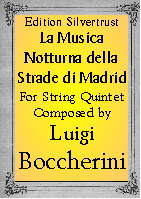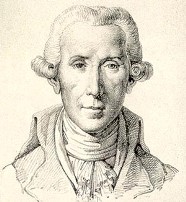Presents
Luigi Boccherini
 |
 |
Soundbites - 1. Ave Maria & Minuet of the Blind Beggars - 2. The Rosary 3.Los Manolos Madrid Street Singers -
4.
La Ritirada di Madrid Retreat of the |
String Quintet No.60 in C Major, G.324
La Musica Notturna delle Strade di Madrid including La Ritirata di Madrid
For 2 Violins, Viola & 2 Cellos
La Musica Notturna della Strade di Madrid is one of only two programmatic works Boccherini composed. It was not published until several years after his death in part because Boccherini told his publisher that, "The piece is absolutely useless, even ridiculous, outside Spain because the audience cannot hope to understand its significance nor the performers to play it as it should be played." Within Spain itself, during his lifetime, the work became quite famous in arrangements of it Boccherini made for piano quintet and also for string quartet and guitar, in which version it has perhaps become best known.
Luigi Boccherini (1743-1805) was born in the town of Lucca in northern Italy. He studied cello and became a virtuoso eventually moving to Spain where he took employment with the Spanish royal family for the rest of his life.
Boccherini actually provided the publisher with program notes. La Musica Notturna delle Strade di Madrid, literally, the night music of the streets of Madrid, was an attempt to recreate what residents of the Spanish capital could expect to hear each night. First there was the Ave Maria of the main church, in which the instruments imitate the tolling of the church bell. Then comes the Minuet of the Blind Beggars to be roughly played peasante. The cellists are directed by Boccherini to take their cellos upon their knees and strum them, imitating a guitar. This is followed by another slow section, The Rosary, not to be played strictly in time. Then there is what Boccherini sarcastically termed the Passacaglia of the Street Singers, Los Manolos. These were lower class loudmouths vulgarly dressed. The movement is not a passacaglia but imitates the way Los Manolos sang, which the Spanish called passacalle and meaning to pass along the street, singing to amuse oneself. Last comes La Ritirata di Madrid (the retreat of the Military Night Watch of Madrid), which by itself, achieved a certain degree of notoriety. It imitates the coming and going of the Military Night Watch, bringing the curfew and closing down the streets. Boccherini wrote, "One must imagine sitting next to the window on a summer's night in a Madrid flat and that the band can only be heard in the far-off distance in some other part of the city, so at first it must be played quite softly. Slowly the music grows louder and louder until it is very loud, indicating the Night Watch are passing directly under the listener's window. Then gradually the volume decreases and again becomes faint as the band moves off down the street into the distance."
In its original version for string quintet, published in Berlin by Bachmann in 1822, strangely the music has been the least often heard and hardest to get. We are pleased to make it available and expect that it will provide much enjoyment to players everywhere.
Parts: $24.95
Parts & Score: $29.95